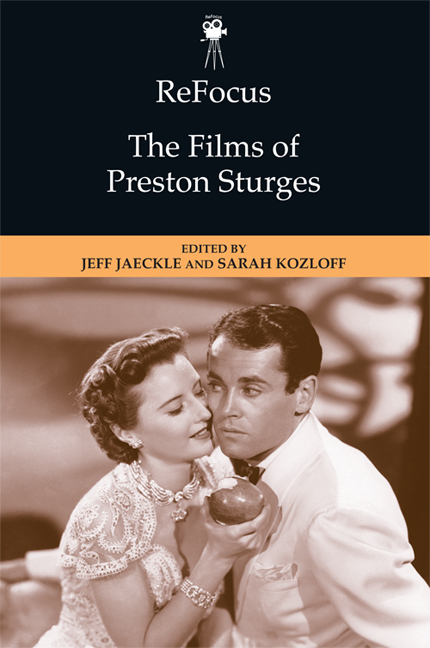Book contents
- Frontmatter
- Contents
- List of Figures
- Notes on Contributors
- Introduction: An Agile Mind—The Many Stands of Preston Sturges
- Part 1 Contexts: Genre, Studio, Authorship
- Part 2 Cultural Commentary: History and Identity
- Part 3 Technique: Scripting, Performance, Music
- Part 4 Impact: Reception/Reputation
- 12 Thrust with a Rapier and Run: The Critics and Preston Sturges
- 13 Hail the Conquering Auteur: Preston Sturges in La Revue du cinéma (1946–1949)
- 14 O Preston, Where Art Thou?
- Index
14 - O Preston, Where Art Thou?
from Part 4 - Impact: Reception/Reputation
Published online by Cambridge University Press: 05 September 2016
- Frontmatter
- Contents
- List of Figures
- Notes on Contributors
- Introduction: An Agile Mind—The Many Stands of Preston Sturges
- Part 1 Contexts: Genre, Studio, Authorship
- Part 2 Cultural Commentary: History and Identity
- Part 3 Technique: Scripting, Performance, Music
- Part 4 Impact: Reception/Reputation
- 12 Thrust with a Rapier and Run: The Critics and Preston Sturges
- 13 Hail the Conquering Auteur: Preston Sturges in La Revue du cinéma (1946–1949)
- 14 O Preston, Where Art Thou?
- Index
Summary
In many ways, except for the enduring popularity of The Lady Eve, Sturges has faded from view in film history. Certainly he has not enjoyed the constant attention and adulation of a Hitchcock, Hawks, or Ford, thus necessitating this ReFocus volume. Even many film scholars have seen only a few of his films. Some titles are hard to find, or available only in poor, unrestored versions.
Yet if one is sensitive to Sturges's themes, tone, and style, in actuality, he lurks everywhere in contemporary films. The reason we must bring him back into focus is that, in many ways, modern filmmakers should be counted as Sturges's (multiple) offspring.
THE COEN BROTHERS
Positif: Viewing Raising Arizona makes you think a bit about Preston Sturges.
Ethan Coen: We are crazy about his films. We love The Palm Beach Story.
Playboy: Several of your films incorporate elements of screwball comedies. What's your favorite of that genre?
Joel: The Miracle of Morgan's Creek, although I'm not sure that it's technically a screwball comedy …
Ethan: I like all of Preston Sturges's comedies.
Though it adds a clever touch, film history aficionados didn't really need the title, O Brother, Where Art Thou?, to see Preston Sturges hiding behind the Coen Brothers’ 2000 movie, grinning. In that film alone, we have a picaresque narrative (like Sullivan's Travels); government corruption (The Great McGinty, Hail the Conquering Hero); a stock company of strange male figures speaking odd dialects (John Goodman, John Turturro, Charles Durning); and equally capricious character names, such as “Pete Hogwallop,” “Vernon T. Waldrip” and “Ulysses Everett McGill.” For Everett to turn out to be the father of seven daughters just does the sextuplets of The Miracle of Morgan's Creek (1944) one better.
For that matter, critics perceive Sturges's influence even earlier in the Coen canon, in Raising Arizona (1987), which throws together physical slapstick, verbal ingenuity, larceny, and … actual quintuplets. The Hudsucker Proxy (1994)—which adds Hawks and Capra to the masala, specifically in the hard-boiled female reporter character—also explicitly refers back to Sturges.
- Type
- Chapter
- Information
- ReFocus: The Films of Preston Sturges , pp. 293 - 310Publisher: Edinburgh University PressPrint publication year: 2015



